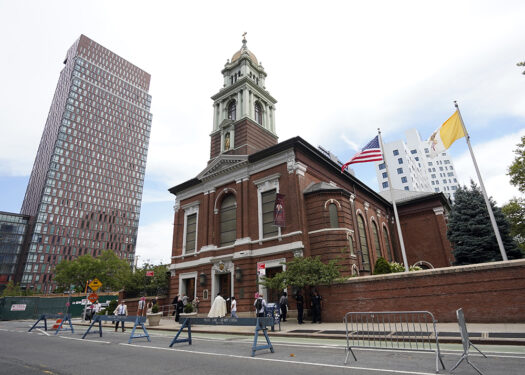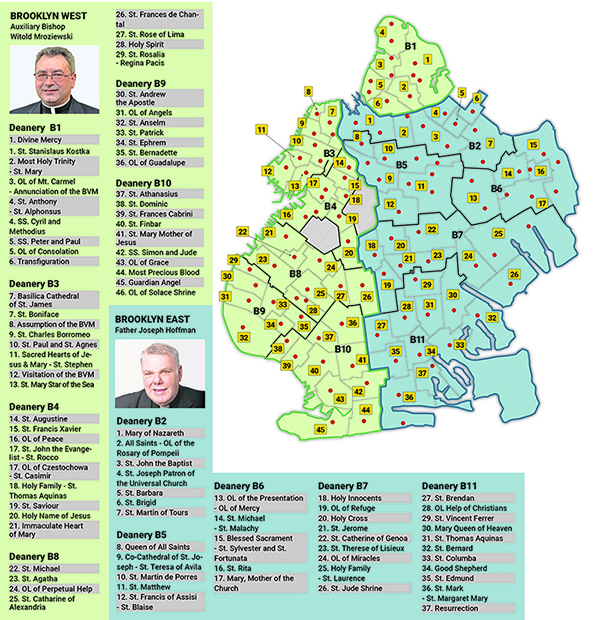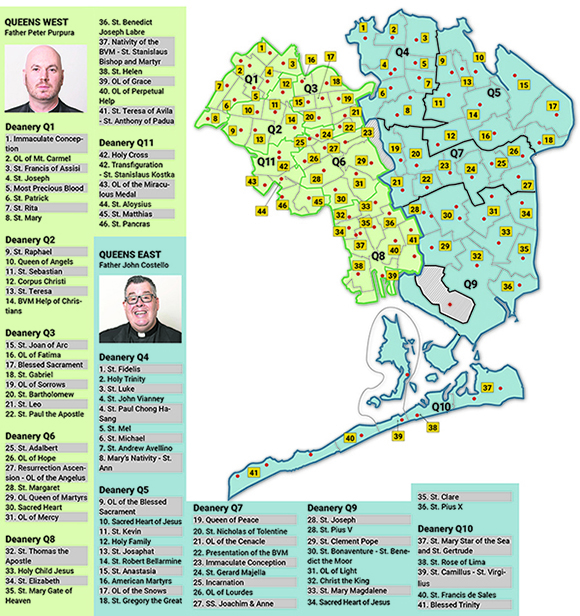
WINDSOR TERRACE — Bishop Robert Brennan has made changes to how the diocese is currently set up with two distinctive boroughs — Brooklyn and Queens — each with an episcopal vicar.
The move includes splitting each borough in half and appointing four vicars, one for each region, in an effort to improve the working relationship between parishes and increase the involvement of diocesan leaders at the local level.
Groups of parishes — known as deaneries — will now be part of Brooklyn East, Brooklyn West, Queens East, and Queens West — depending on where they are located.
The newly appointed leaders of these regions are:
- Auxiliary Bishop Witold Mroziewski, pastor of Holy Cross in Maspeth, and vicar for the diocese’s Migrant and Ethnic Apostolates will lead Brooklyn West.
- Father Joseph Hoffman of St. Barbara’s in Bushwick-Ridgewood, and a chaplain for the Fire Department of the City of New York, will lead Brooklyn East.
- Father Peter Purpura of Our Lady of Hope in Middle Village will lead Queens West.
- Father John Costello of St. Luke’s in Whitestone will lead Queens East.
In a statement, Bishop Brennan explained that expanding the number of territories and its leadership is a benefit to both the four priests and the faithful they serve.
“In an effort to increase the involvement of the vicars at the parish and deanery level, I have decided to expand the number of such positions from two to four in the diocese,” Bishop Brennan said.
“I am asking a lot of these priests taking on this new role, all the while remaining parish pastors, and so expanding the number of regional vicariates will make the responsibilities more manageable.”
Bishop Brennan added that for the past year, the diocese has worked to “reinvigorate the deaneries,” and this move is another step in the right direction of creating “a more proactive working relationship among parishes” with an eye still toward the diocese’s future.
“As we move forward, aware of the changing demographics and with the reality of fewer priests, we must look in this direction as we plan for the continued vitality of the Church here in Brooklyn and Queens in the future,” Bishop Brennan said.
The diocese has 22 deaneries that are split among the new regional leaders.
Formally titled Regional Episcopal Vicars, the four priests in their new roles will attend deanery meetings and meet individually with the deans in their vicariate a minimum of four times a year.
They further will support diocesan initiatives, install and assist new pastors in their region, investigate and address complaints made to Bishop Brennan and complaints of inappropriate conduct made to the diocese, as well as participate in the diocese’s pastoral planning, the diocese said.
They will also have a general delegation, permission to grant confessional faculties and permission to dispense from matrimonial impediments within the confines of the diocese.
With the appointment also comes a commitment to regularly meet with Bishop Brennan about their vicariate, seats on the Presbyteral Council and Diocesan Assignment Board, and the duty to represent Bishop Brennan at civic and religious functions.
Up to this point, Bishop Mroziewski led the Queens region, and Auxiliary Bishop Neil Tiedemann led the Brooklyn region. Bishop Tiedemann turned 75 earlier this year, and, as canon law requires, submitted his resignation to Pope Francis.
The four new appointments will become effective when Pope Francis accepts Bishop Tiedemann’s resignation for retirement.
Each priest expressed their gratitude for their added responsibilities.
Bishop Mroziewski said that he looks “forward to taking responsibility and collaborating” with the clergy, religious brothers and sisters, and laypeople to “build the bridges of harmony, understanding, and cooperation.”
Similarly, Father Costello said he hopes that he can both help Bishop Brennan respond “to the needs of the diocese, and at the same time begin to plan for the future.”
Msgr. Joseph Grimaldi, vicar general for the Diocese of Brooklyn, said that each of the four priests in their new roles will help the diocese fulfill its future pastoral initiatives.
“These well-respected members of the presbyterate bring with them extensive service as parish leaders,” Msgr. Grimaldi said. “Their efforts will help advance conversations and plans to best serve the Catholic community within their region of the diocese.”


